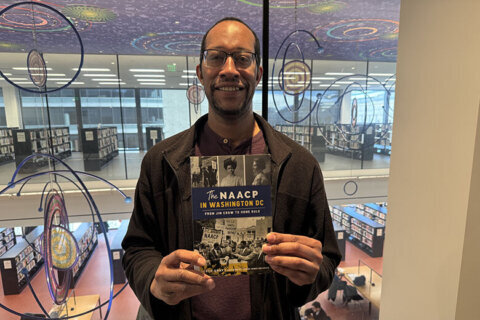The D.C. Council is set to vote on a proposal making all Metrobus service in the District free starting next Summer.
In addition, the city’s 12 busiest bus lines would run 24 hours a day under the new proposal, unveiled Thursday by D.C. Council Chairman Phil Mendelson and Ward 6 Council member Charles Allen.
The council is set to vote on the measure Dec. 6.
The plan derives from Allen’s proposal called “Metro For DC,” which originally aimed to subsidize Metrorail service for all D.C. residents to the tune of $100 a month. Allen and Mendelson said they still both hope to accomplish that beginning in October 2024, but say the proposal for bus service will provide an equitable benefit to working class District residents.
“We know that a quarter of riders in D.C. earn less than $10,000,” said Allen. “Nearly 70% earn less than $50,000. Making our D.C. buses free will benefit D.C. residents and about 84% of all bus riders in the District are D.C. residents. This is going to be a massive improvement in their day-to-day.”
Mendelson boasted that D.C. would be the first major city to offer free bus transit, and said he expects other cities around the country to copy what D.C. is doing.
“I think we’re going to see changes in ridership patterns with public transit with this free bus,” said Mendelson. “Maybe … fewer folks use rail because it’s cheap and easy to use bus.”
The 24-hour service on Metro’s busiest bus lines is also being touted as a boost to the city’s fledgling nightlife, with downtown restaurants and bars, especially, still facing a slower recovery since the pandemic began.
“Adding in the additional routes that are going to run overnight, it’s incredibly important for the workers and the workforce of those venues. It’s also incredibly important for the customers and patrons of those spaces,” said Allen. “It’s part of D.C. being a 24-hour city and it’s going to be crucial to our recovery.”
The restaurant industry is in total agreement.
“Good transportation policy, first of all, has a net economic benefit. Second of all, it broadens the market,” said Che Ruddell-Tabisola, the director of government affairs and media advocacy for the Restaurant Association of Metropolitan Washington. “We’re looking at increasing the number of guests coming to our downtown restaurants and bars.”
He also described the overnight bus service as a “huge” boost for restaurant workers, especially those who might be limited to ride-sharing home because they don’t finish working until after Metro stops running.
“So many of our most talented staff, they get off of work closing the kitchen, closing up the bar… Having safe, reliable and, now, free transportation home is a really great thing,” he added.
If the council approves the bill, filed as emergency legislation, Mendelson said it would cost an estimated $43 million total, between the free bus rides and the later hours. There’s also funding for improved bus infrastructure, like additional bus-only lanes, new bus shelters and other improvements. Mendelson said it’ll make buses faster and more efficient.
“Right now if a bus pulls up to a bus stop and there are a number of people who have to get on, each one has to go past the fare box and that slows things down,” said Mendelson. “This will be faster. And because buses will be faster, it means they will be adhering closer to what their schedules are.”
The move comes only a few years after the council fought a proposal by the mayor to make rides on the separate, city-owned Circulator bus service free.
“We’re in a different place now,” Mendelson said. “If we want to discuss the Circulator, we can do that when we have the budget next year, and I’m certainly not standing here saying that that would be off the table.”
He added, “Making bus service free to anybody in the District of Columbia, not only would be a forerunner for everybody in the country, every major city in the country, but it may be a forerunner with regards to other programs.”
He suggested future subsidies could cover Metrorail — though that would be much more long term — as well as the Circulator, as candidates for future subsidies.
The mayor’s office hasn’t responded to comments about the proposal.








